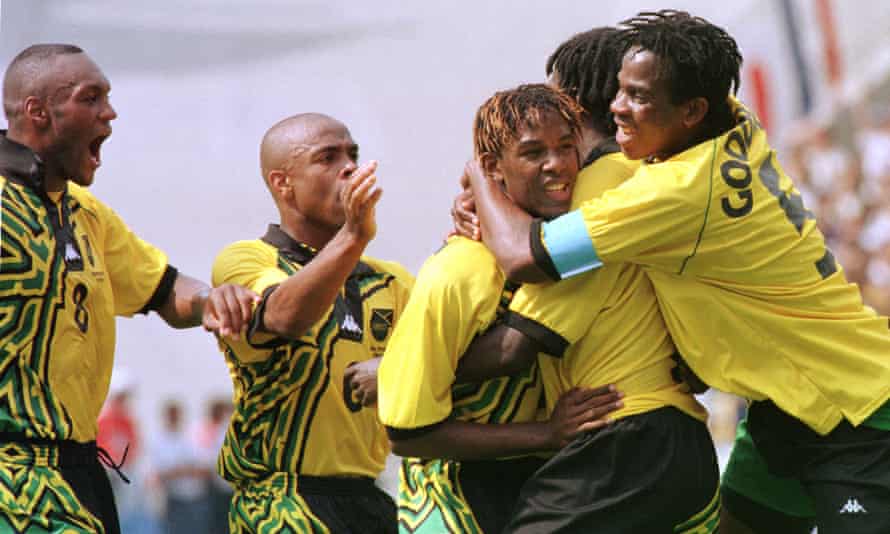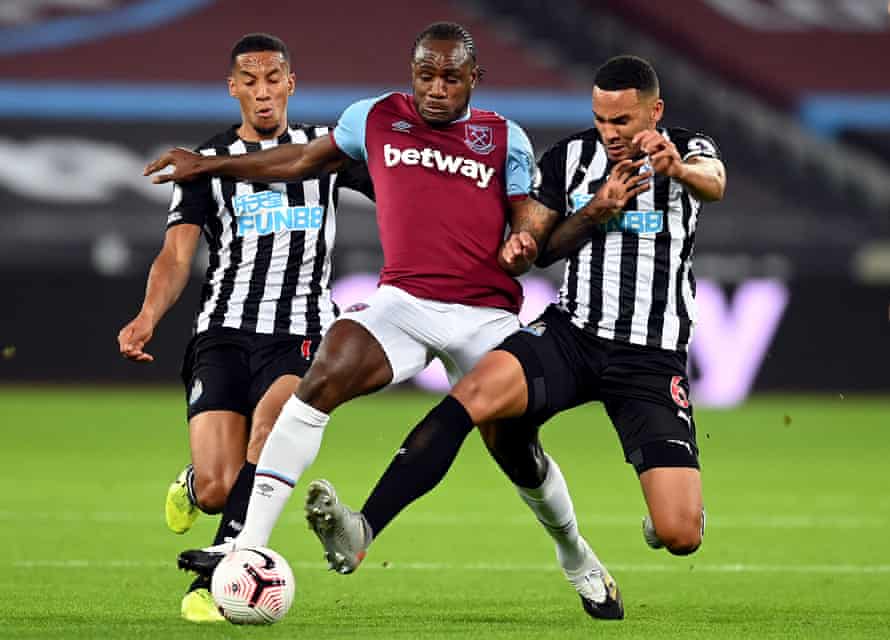“It’s not quite what we are accustomed to, but we are making the most of it,” says Michael Ricketts of the climate in Wiener Neustadt, 30 miles south of Vienna. The president of the Jamaican Football Federation is with his team in Austria for a prestige friendly with the United States and Covid is not the only thing that has necessitated adjustments. “It’s really cold, but we are managing,” he says. “We are of course clad to handle the weather.”
In these most uncertain times, Fifa has drafted emergency regulations that allow for international fixtures to be played in the most unlikely locations. So it is that two of Concacaf’s biggest hitters are playing off in central Europe on Thursday. But given the European makeup of both squads, there is a logic to it, one that has only grown stronger since Jamaica recently expanded their selection pool by recruiting heavily among players born in England.
The latest Reggae Boyz squad features six players who committed their international future to the country this month. Andre Gray, Liam Moore and Ethan Pinnock, all starring in the upper echelons of the Championship this season, were joined by Curtis Tilt, Wes Harding and Amari’i Bell. More England-born players are expected to come; Demarai Gray and Mason Holgate are among the names mentioned.
“Certainly, we want the best players playing for us,” says Ricketts, and the biggest catch of all would be Michail Antonio, with the West Ham forward widely expected to declare for Jamaica soon. “It’s pretty safe to say yes [he will],” Ricketts says. “We haven’t signed a contract but we have had a number of discussions in this regard and he has given positive indications that, yes, he wants to play for Jamaica.”
It has happened before, of course. In the late 1990s a clutch of English Premier League stars, including Robbie Earle, Frank Sinclair and Marcus Gayle, embraced their dual heritage to lead Jamaica to a first World Cup finals at France 98 and a third-place finish in their group. It wasn’t quite Cool Runnings, but it was a milestone in Jamaica’s sporting history and one of the stories of the tournament. It was success that hasn’t been matched since.

There’s now a chance to do it again, as Jamaica find themselves fast-tracked to the latter stages of qualification for Qatar 2022. Alongside the USA, they will be one of eight sides playing 14 qualifying fixtures between September and March in the hope of sealing one of three World Cup places.
“As a second-generation Jamaican it’s pure excitement,” says Michael Johnson, who played for the country 13 times in the noughties. “If they get the majority of the players they’re targeting, all of a sudden Jamaica could be a serious candidate in terms of qualification.”
Johnson, the former Birmingham and Derby midfielder, is a coach with the England Under-21s setup and has also managed Guyana. He acknowledges that for players of Caribbean heritage choosing which country to declare for can often be quite straightforward.
“Let’s be honest here: Caribbean football is not as far developed as as European football and for obvious reasons,” he says. “The finances are completely different. The resources in terms of pitch infrastructure, expertise, all that, the Caribbean is being left behind. So when you come to make your decision about which one you choose, those factors come into play.”
With England almost guaranteed to feature at most major championships, Johnson says it is only when a player reaches his later years, and the hopes of playing for them diminish, that considering the country of their parents or grandparents becomes a reality. The pendulum swings further if there’s a belief that, as in 98, they could actually help achieve qualification, triggering what Johnson calls “the legacy piece”.

“That’s a powerful thing,” he says. “Obviously the players are English-born, but they have heritage which they understand [through] their parents and grandparents. No doubt many of these players go back to Jamaica or Barbados or wherever it might be in the Caribbean in the off-season. So they get an understanding of how powerful football can be. How, individually, they could impact a country if they managed to bring success home.”
This is a dynamic Ricketts also observes and is keen to tap into. “The truth is that Jamaica is blessed with talent and that Jamaica is a brand,” he says. “We want to use what we are blessed with to ensure we have good and positive results. We are in a position now with the advent of a number of overseas-based players, that we are very positive they could influence us both commercially and socially”.
Pretty much every country takes advantage of the opportunities presented by dual heritage – the decision by Jamal Musiala to choose Germany over England showing it happens even among countries at the very top of Fifa’s rankings. For a small country such as Jamaica, however, tapping into the current strength of the English game could have benefits beyond just improving their immediate hopes for Qatar.
Professor Simon Chadwick is the director of Eurasian Sport at the Emlyon Business School and a keen observer of how sport interacts with global politics. He sees clear off-field benefits for Jamaica in recruiting Antonio and co.
“Such is the prestige of the Premier League that Jamaican football may be able to derive image and reputational benefits from an association,” he says. “This type of attraction is what underpins soft-power projection; soft power is attractive power, a way of shaping how others see you. This then links to the way in which nations brand themselves, which manifests itself as a proposition or a promise.
Sign up to The Recap, our weekly email of editors’ picks.
“As such, a Jamaican team packed with overseas stars would likely promise skill, strong performances and team success. This would engage the likes of sponsors and commercial partners, yielding a financial return. It would also help to build fan engagement across diaspora communities, resulting in loyal fandom, and the generation of customer lifetime value for the Jamaican FA. Some might sneer at such logic. However this is the nature of football’s new geopolitical economy. Money, politics, identity and sport do inevitably have to mix.”
Such is the nature of this simple game, meanwhile, that if Jamaica don’t get something away at Costa Rica this winter, dreams of a global brand may need to be put back on the shelf. But if an English-accented Reggae Boyz do make it to the Gulf in December next year, Ricketts believes exciting times lie ahead. “If we were ever to get to the World Cup,” he says, “and we are positive that we will, it’s going to have a major major impact on the lives of every single Jamaican.”
from Football | The Guardian https://ift.tt/3fhw1Sr
via IFTTT

No Comment